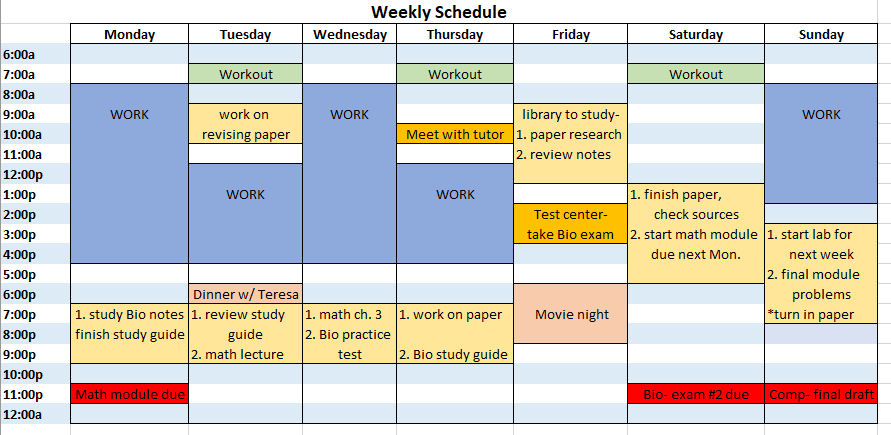Getting Started With Time Management
 Figuring out the best use of your time and how to balance everything going on is a continual challenge. If you don’t currently have a method that helps you review the best way to work through tasks, here are some great options to start. The key to good time management is finding what works for you and staying consistent with whatever you choose.
Figuring out the best use of your time and how to balance everything going on is a continual challenge. If you don’t currently have a method that helps you review the best way to work through tasks, here are some great options to start. The key to good time management is finding what works for you and staying consistent with whatever you choose.
- Get organized! It is recommend for students to have two types of calendars they keep updated to help you plan for both the short and long-term. One should be monthly or per semester to provide an overview of any important dates such as exams, papers due, holidays, and personal obligations. The second is a weekly or daily calendar that you can use to block out your time for daily tasks you want to accomplish.
- Studies show that when you set aside time for specific tasks, it helps to boost your productivity. At the beginning of each week, take some time to plan what you need to do and intentionally schedule when you will complete work for each class and studying. You can then assign certain tasks (e.g., reading, Assignment 1) to specific time blocks. This will help you know right away what to start with when you sit down to get to work. Below is a sample of what a time-blocked weekly schedule looks like!
- Pay attention to due dates and try to give yourself extra time to complete assignments. If something comes up or you have any questions, you then have time and don’t miss a deadline.

- Find a system that works for you. If you prefer not to have a physical planner, consider using your email’s calendar feature or a calendar app to help you keep track of tasks and to set reminders and alerts. Other options include post-it notes or a white board on your wall. Whatever you choose, it’s most important to keep it simple to use and easy to update so that you are able to stick with it.
- There are some great options for this in the next section.
- Create a realistic routine. Be creative if you need with how you build working on each class into your current schedule. Think about when the best parts of your day are and try to schedule for times when your energy is at its best. Start slow with adding in time to study that you can realistically stick to and focus on being consistent with using the time you set aside wisely. You will find what works for you and, if you stick with it, be able to create a routine that helps you not miss anything.
- If you need help sticking with your plans, consider asking a friend or family member to check in with you and help keep you accountable for those bigger projects.
- When you plan out your day, think about what task or goal is the most important for you to accomplish. It can be the most daunting or most urgent task, but that is where you should focus first. When you complete it, that can be something you feel good about.
- Consider the 1-3-5 method, where to help you balance your priorities and energy, you schedule time daily to tackle 1 big task, 3 medium, and 5 smaller responsibilities.
- Start off your day with a win! Create a morning routine for yourself that will help you set yourself up for success as well as boost your productivity through the day.
- Having a routine where you plan ahead for each day and week can help decrease decision fatigue. Simple steps such as meal planning, setting out outfits, or having limits on your choices (pick from two things vs giving yourself five options) can all help to reduce stress and the energy it takes to decide smaller choices through the day so that you can use that energy on more important ideas or projects. For more, here is a quick article on 8 signs of Decision Fatigue and How to Cope.
- What is worth your time? Be realistic with your responsibilities and try to only take on what you truly have time to be successful with. Be intentional with what you say yes to so you can put the appropriate energy into those items rather than filling your time with non-important distractions.
- Consider what you are spending time on. How much time do you spend on your phone a day checking the same apps over and over? Ask yourself what “time-wasters” you could reduce or remove from your schedule so that you can focus more on what is needed to accomplish your goals.
- Remember that breaks are okay and you need some time to rest as well. Plan in reasonable downtime and fun activities that energize you in addition to schoolwork. It’s all about balance!
“A goal without a plan is just a wish.” -Antoine de Saint-Exupéry

